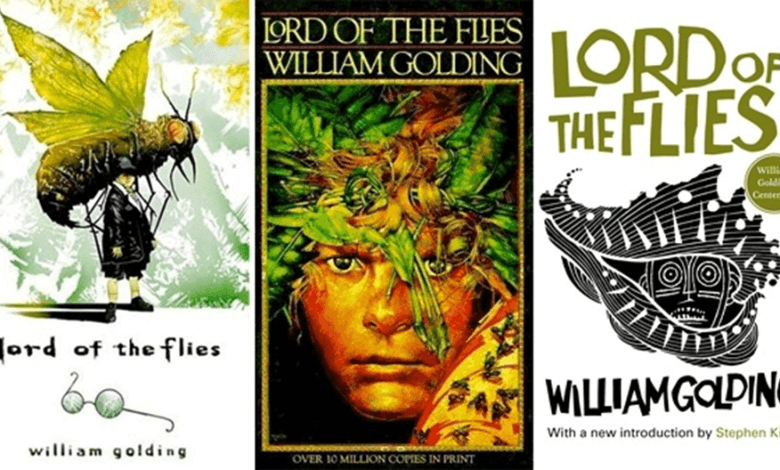
Lord of the Flies is a classic novel by British author William Golding, first published in 1954. The story takes place on a deserted island and follows a group of young boys who must fend for themselves after their plane crashes. As they struggle to survive and establish order, tensions rise and a power struggle emerges between the group’s leaders. Golding uses the novel to explore the darker aspects of human nature, examining how individuals and groups can descend into savagery and chaos when stripped of societal constraints. The book has been widely studied in schools and universities, and has become a powerful allegory for the inherent flaws of human society.
Lets start with Lord of the flies summary:
Lord of the Flies Summary
Lord of the Flies is a novel by William Golding that tells the story of a group of British boys who become stranded on an uninhabited island. The boys, who range in age from six to twelve, are forced to fend for themselves and quickly establish a hierarchy based on age and physical strength.
At first, the boys attempt to create a sense of order and civilization on the island. They elect Ralph as their leader and establish rules for themselves, using a conch shell to call meetings and maintain order. However, as time goes on, the boys begin to lose their sense of discipline and descend into savagery.
One of the boys, Jack, begins to reject Ralph’s authority and forms his own tribe of hunters. The boys’ attempts to hunt and kill a wild pig become increasingly violent and brutal, and they begin to act out their most primal desires.
As the novel progresses, the boys become increasingly isolated and paranoid. They begin to believe in the existence of a beast on the island and become convinced that it is watching them. This fear leads to further violence and chaos, as the boys turn on each other and begin to engage in brutal acts of violence.
In the end, the boys are rescued by a passing naval officer, but their time on the island has left a lasting impact. The novel serves as a powerful commentary on the human condition, suggesting that without the constraints of civilization, humans are capable of extreme violence and brutality.
A Thousand Splendid Suns: Summary, Analysis & IMP Themes
Lord of the Flies Characters Analysis
Lord of the Flies features a diverse cast of characters, each representing different aspects of human nature. Here is an analysis of some of the key characters:
Ralph- Lord of the Flies

Ralph is one of the older boys on the island and is elected as the group’s leader. He represents the rational and democratic side of human nature. He is determined to maintain order and establish a system of rules to ensure the boys’ survival.
Jack- Lord of the Flies
Jack is a charismatic and aggressive boy who forms his own tribe on the island. He represents the savage and authoritarian side of human nature. Jack becomes increasingly violent and obsessed with hunting, and his actions lead to the group’s downfall.
Piggy- Lord of the Flies

Piggy is a bespectacled and intelligent boy who serves as Ralph’s advisor. He represents the intellectual and rational side of human nature. Despite his intelligence, Piggy is often dismissed and ridiculed by the other boys, which ultimately leads to his tragic demise.
Simon- Lord of the Flies
Simon is a quiet and introspective boy who spends much of his time exploring the island. He represents the spiritual and intuitive side of human nature. Simon has a deep understanding of the true nature of the “beast,” and his death symbolizes the loss of innocence and hope on the island.
Roger- Lord of the Flies
Roger is a sadistic and violent boy who follows Jack’s lead. He represents the cruel and sadistic side of human nature. Roger becomes increasingly brutal throughout the novel, eventually leading to the deaths of Piggy and Simon.
Old China Summary and Analysis (Charles Lamb)
Major Themes in Lord of the Flies:
Civilization vs. Savagery –

The theme of civilization vs. savagery is central to the novel. The boys are initially hopeful of creating a society that reflects the values of the world they have left behind, but as their situation deteriorates, they become increasingly savage. The boys’ descent into savagery represents the idea that without societal constraints, humans are capable of extreme violence and brutality. This theme is exemplified when Ralph says, “What’s grown-ups going to think? We’ve got to have rules and obey them. After all, we’re not savages” (Chapter 2). This quote highlights the tension between the boys’ desire for order and the underlying savagery that threatens to consume them.
Power and Control –
The theme of power and control is evident in the novel’s exploration of leadership, authority, and dominance. The boys’ struggle for power and control reflects the inherent human desire to be in control and to assert dominance over others. Jack’s desire for power is particularly strong, as he seeks to overthrow Ralph and establish his own tribe. As Jack says to his tribe, “I ought to be chief, because I’m chapter chorister and head boy” (Chapter 1). This quote highlights the way in which individuals use their positions of authority to assert their dominance over others.
Fear and Paranoia –
Fear and paranoia are pervasive themes in the novel, reflecting the idea that in times of uncertainty, humans can become irrational and superstitious. The boys’ fear of the supposed “beast” on the island leads them to engage in violent and aggressive behaviour. As the fear intensifies, the boys become more paranoid and start to turn on one another. Simon’s quote, “Maybe it’s only us” (Chapter 5), is particularly telling, as it suggests that the true source of the boys’ fear is their own innate savagery.
Loss of Innocence –

The theme of loss of innocence is central to the novel’s exploration of the darker aspects of human nature. The boys’ descent into savagery represents a loss of innocence, reflecting the idea that in the absence of societal constraints, humans are capable of extreme violence and brutality. The deaths of Piggy and Simon are particularly symbolic of the loss of innocence on the island. As Ralph reflects at the end of the novel, “I’m frightened. Of us” (Chapter 12). This quote highlights the idea that the boys have lost their innocence and descended into darkness, reflecting the inherent darkness that exists within all humans.
Symbolism used in Lord of the Flies:
Lord of the Flies is a complex novel that employs a wide range of symbols to explore its themes and ideas. Some of the key symbols in the novel include:
The Conch –

The conch shell is a powerful symbol of order and civilization in the novel. It represents the boys’ desire to establish rules and order on the island. As long as the boys respect the authority of the conch, they are able to maintain a semblance of civilization. However, as the novel progresses, the power of the conch begins to wane, reflecting the breakdown of order and the rise of savagery on the island.
The Beast –
The beast is a symbol of the boys’ fear and their descent into savagery. While the boys initially believe that the beast is an external threat, it is eventually revealed that the true source of the beast is their own innate savagery. The beast represents the darkness that exists within all humans, and the potential for that darkness to consume us.
The Pig’s Head –

The pig’s head, or “Lord of the Flies,” is a symbol of the boys’ descent into savagery and their rejection of civilization. The head serves as a reminder of the boys’ brutality and their rejection of societal norms. It represents the idea that in the absence of civilization, humans are capable of extreme violence and brutality.
The Island –
The island is a symbol of the boys’ isolation and their separation from society. It represents the idea that in the absence of societal constraints, humans are capable of extreme violence and brutality. The island is also symbolic of the boys’ journey from innocence to experience, and their loss of innocence as they descend into savagery.
Also Check: A Case of Exploding Mangoes Summary, Analysis & IMP Themes
Some Important questions Related to this Novel:
What is Lord of the Flies actually about?
Lord of the Flies is a novel by William Golding that explores the darker aspects of human nature. The novel tells the story of a group of British boys who become stranded on an uninhabited island and must fend for themselves. As the boy’s struggle to survive, they quickly descend into savagery, revealing the dark potential that exists within all humans. The novel is a powerful commentary on the human condition, suggesting that without the constraints of civilization, humans are capable of extreme violence and brutality.
Why was Lord of the Flies banned?

Lord of the Flies has been banned in some schools and libraries due to its graphic violence, sexual content, and themes of racism and misogyny. The novel includes scenes of murder and mutilation, as well as references to rape and other forms of violence. Additionally, some critics argue that the novel perpetuates harmful stereotypes about race and gender. However, defenders of the novel argue that it is a powerful commentary on the darker aspects of human nature and that its themes are still relevant today.
What does Lord of the Flies symbolize?
Lord of the Flies is a complex novel that employs a wide range of symbols to explore its themes and ideas. Some of the key symbols in the novel include the conch, the beast, the pig’s head, and the island. These symbols represent the boys’ struggle to maintain order and civilization on the island, as well as their descent into savagery and violence. Overall, the novel serves as a powerful reminder of the darker aspects of human nature and the potential for violence and brutality that exists within all humans.
Why is it called Lord of the Flies? Or Title Significance of the Novel:
The title “Lord of the Flies” is a translation of the biblical name “Beelzebub,” which is often used as a name for Satan. In the novel, the pig’s head, which is referred to as the “Lord of the Flies,” serves as a powerful symbol of the boys’ descent into savagery and their rejection of civilization. The name “Lord of the Flies” suggests that the boys have become like flies, buzzing around a rotting carcass, and that they have given in to their basest instincts and desires.



